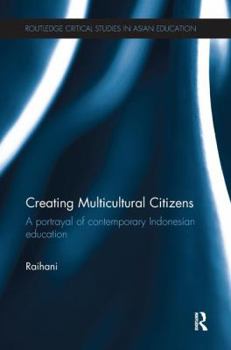Creating Multicultural Citizens: A Portrayal of Contemporary Indonesian Education
(Part of the Routledge Critical Studies in Asian Education Series)
Select Format
Select Condition 
Book Overview
Despite the largest-scale decentralisation of education since 1999, which broadly led to the marketisation of education, it is not clear how school education responds to the multicultural realities of Indonesian society and ethno-religious conflicts. Creating Multicultural Citizens presents a comprehensive evaluation of contemporary education in the largest democratic Muslim country in the world, focusing on the ways in which education prepares citizens for a multicultural society. It thoroughly examines the state-religion-community roles in the field of education in developing the Indonesian people. Using a qualitative ethnographic methodology, the author presents six case studies of different schools, including religious, non-religious, state and private schools, in two different provinces in Indonesia. It particularly explores:
Evolving but contested theories of multiculturalism and multicultural education;
Education changes and reforms in post-Suharto Indonesia;
Government policies for multicultural education and school curriculum;
School leadership for education for diversity;
Roles of religious education in schools in nurturing multicultural beliefs, values and attitudes;
Extra-curricular activities and tolerance;
Students' perspectives of multiculturalism and the ideal society;
The promising development of a pesantren (Islamic boarding school in establishing multicultural education.
It is the first book to explore how education in Indonesia helps contribute to the creation of tolerant and multicultural citizens and is essential reading for anyone involved in Indonesian education and international higher education.





